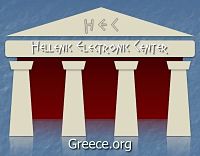We are a group of Hellenes, 100% non-paid volunteers, who love our country and we have established a non-profit, cultural, non-political electronic organization, Hellenic Electronic Center (HEC). See PowerPoint documents in PDF:
Who we are – Current HEC Executive Council Members:
Thanos Voudouris, Anna Lawless, Eleni Bomis, Stelios Manias, Gus Stamatis, Nico Michael, Mario Chinas ( archived )
HEC Members – Database of HEC Members
Executive Summary – Dear Supporter… [ English ] [Ελληνικά ]
Presentation – HEC Informational Presentation
Strategy – HEC Strategy Presentation [ English ] [Ελληνικά ]
Tri-fold – One page (front-back) Tri-fold about HEC
Finances – Financial Statements
HEC Lists Moderators – Anna Lawless, Terry Dritsas
This is our home – www.Greece.org and www.ehk.gr
Our mission is to establish a sound, well organized, useful, and highly visible presence of Hellenism on the Internet, providing the means to disseminate information about Hellenism, promoting awareness, and make available free Electronic services to other Hellenic non-profit organizations and projects focusing on cultural and education aspects.
We are inviting you to volunteer and join us.
The only qualification required is willingness to contribute a few electronic hours per month to this magnificent project by the name HEC. We have spent already two years working on the foundation of HEC. During this time we accumulated enough experience to know how to utilize the services of Internet for the benefit of Hellenism.
Thank you.
The HEC Proposal (Historical – 1996)
The Hellenic Electronic Center (HEC) is created as a non-profit, non-political organization, and as a major facility to disseminate information about Hellenism through Internet, the global communications network. Internet is growing into a planet-wide information infrastructure linking millions of users around the world who use the network for information and entertainment.The nature and scope of the Internet make it an ideal environment to promote the rich culture and vast civilization of Greece.
The widespread availability of Internet services in the USA and the European Union has brought together a core of individuals who shared the same vision: To establish a sound, well organized, useful, and highly visible presence of Hellenism on the Internet. Therefore, the HEC is sought as an umbrella organization with the following objectives:
- to actively support projects promoting the Hellenic culture and civilization throughout the Internet;
- to continuously compile archives of sources pertinent to the Hellenic culture and civilization available on the Internet;
- to continuously compile indices to information services on the Internet, related to the Hellenic culture and civilization;
- to manage and coordinate the dissemination of information about the Hellenic culture and civilization, past and modern;
- to serve as a communication node for Hellenes throughout the world;
- to continuously compile all freely available technical material on the Internet related to Greek computing; this includes software, technical documents, standards, fonts, etc;
- to provide a “home” for the development of technical projects directly or indirectly related to Greece. The outcome of such projects should be freely available;
- to act as a link between Greece and Diaspora;
- to serve as universal electronic gateway to Greece.
To meet these objectives, HEC plans to accomplish the following specific goals:
- propose, implement, and promote projects related to the Hellenic culture and civilization;
- seek financial support for the realization of these projects;
- finance, operate and manage an information center;
- promote its mission to miscellaneous Hellenic communities and organizations throughout the world.
As part of its mission the HEC has initiated and is currently implementing a project to record the long tradition of Greece and the Sea. The project is called “POSEIDON-HELLAS AND THE SEA” and it traces the maritime history of Greece through the centuries. Poseidon shows how the sea has affected the Hellenic culture and spirit, and it explains why Greece is one of the most powerful maritime nations in the world today.
To succeed its mission HEC has enlisted the assistance of skillful and talented volunteers from around the world. Using the Internet to communicate, these volunteers coordinate their efforts to collect, archive, and compile information about the HEC projects. They then make this information available through various Internet services such as the World Wide Web or Gopher. HEC is organized in a decentralized way. An elected board of directors makes the major decisions about the Center’s mission, while everyday management of the projects is left to the volunteers. The volunteers include shipping people, academicians, professionals, students, and business people.
The Hellenic Electronic Center is currently at a beginning stage. To continue its operations and to provide the services it has planned, it needs financial support. Buying larger computers and finding permanent housing with a secure access to the Internet are the two major problems HEC is trying to solve. Therefore, HEC solicits and will recognize any sponsorship to keep the Hellenic spirit alive.
The Launch of HEC
